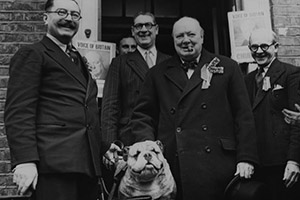
History-Periods
Past eras

From pre-history to today
Choose your period

Periods of History
explore the different eras

Winston Churchill returned to the office of Prime Minister of the United Kingdom in 1951, after the Conservative Party, led by Sir Anthony Eden, won the general election. Churchill had previously served as Prime Minister during World War II, but he had been replaced by Clement Attlee's Labour Party in the 1945 general election.
Churchill's return to power in 1951 was due in part to his popularity as a wartime leader and his reputation as a strong and charismatic figure. However, his government faced numerous challenges, including economic difficulties, the threat of communism, and ongoing tensions in the British Empire.
During his second term as Prime Minister, Churchill focused on foreign affairs, particularly Britain's relationships with the United States and the Soviet Union. He also oversaw the country's transition to a nuclear power, with Britain conducting its first atomic bomb test in 1952.
One of Churchill's most significant actions as Prime Minister was his decision to negotiate a ceasefire in the Korean War in 1953. He also worked to strengthen ties with Commonwealth countries and played a key role in the founding of the European Economic Community.
Churchill's health was a concern during his second term in office, and he suffered a stroke in 1953. However, he continued to serve as Prime Minister until 1955, when he resigned due to his declining health.
The impact of Churchill's return to power was significant for England. His leadership helped to restore national pride and confidence, and his reputation as a wartime hero resonated with the British public. However, his government also faced numerous challenges, and the country continued to grapple with economic difficulties and other issues in the postwar era. Overall, Churchill's second term as Prime Minister was marked by both triumphs and challenges, and his legacy as one of Britain's most important leaders remains firmly intact.
The 1951 general election was fought between the Conservative Party, led by Sir Winston Churchill, and the Labour Party, led by Clement Attlee. The election was held on 25 October 1951, and resulted in a victory for the Conservatives.
One of the main issues of the 1951 campaign was the state of the economy. Britain was still recovering from the devastation of World War II, and there were concerns about high inflation and a balance of payments deficit. The Conservatives promised to implement policies to stimulate economic growth and reduce inflation, while Labour focused on maintaining the welfare state and protecting workers' rights.
Another key issue was Britain's role in the world. The country was facing new challenges in the post-war era, including the rise of communist powers, the decline of the British Empire, and the need to rebuild relations with the United States. Churchill was seen as a strong leader who could navigate these challenges, while Labour was criticized for its perceived weakness on foreign policy.
One event that had a significant impact on the election was the introduction of television broadcasting. The BBC had launched its television service in 1936, but it was not until the 1951 election that television was used as a tool for political campaigning. The parties used TV to broadcast campaign speeches and other messages, reaching a wider audience than ever before.
The election campaign was also notable for its use of propaganda. Both parties produced posters and leaflets highlighting their policies and attacking their opponents. The Conservatives used the slogan "Set the people free" to promote their vision of a free market economy and reduced government intervention, while Labour's slogan was "Let us face the future" emphasizing the need for a welfare state and government intervention to create a fairer society.
In the end, the Conservative Party won the election with a majority of 17 seats in the House of Commons. Churchill returned to office as Prime Minister, with a mandate to implement his party's policies on economic growth, foreign policy, and other issues facing post-war Britain. The 1951 election marked a turning point in British politics, with the Conservative Party returning to power after six years in opposition and setting the stage for a period of relative stability in British politics.
Winston Churchill and the Conservative Party lost the 1945 general election to the Labour Party led by Clement Attlee for several reasons.
Firstly, the public was exhausted from the war and wanted a change from the pre-war government. Churchill was associated with the war effort and many voters believed that it was time for new leadership to address the challenges facing post-war Britain.
Secondly, the Labour Party had a strong platform that appealed to many voters. They promised to create a welfare state, nationalize major industries, and introduce full employment policies. These policies were popular among the working-class voters who made up a large part of the electorate.
Thirdly, Churchill was criticized for his handling of domestic issues, such as food shortages and the housing crisis, during the war. While he was seen as a great wartime leader, many voters felt that he was out of touch with the needs of ordinary citizens.
Finally, the Conservative Party had a difficult time campaigning during the war due to wartime restrictions on political activity, while the Labour Party was able to build up its organization and support during this period.
All of these factors contributed to the Labour Party's victory in 1945 and the subsequent defeat of Churchill and the Conservative Party.
If you have a suggestion regarding additional topics you would like to see included - please let us know
Reference: Article by Greg Scott (Staff Historian), 2024
Tour Reviews
History Attractions
Submit Tour Suggestions
2024 Departures
Spotlight Tours
Events and anniversaries

All content and images are protected by copyright to Access History